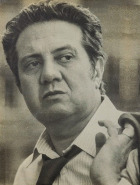

Soares offered a critical assessment of his experience at the Faculty of Arts, denouncing how some professors interfered with students' academic progress based on ideological differences. His personal experience is a clear example of this when, in 1950, during the defence of his first dissertation, he faced hostility from Prof. Délio Nobre Santos, who accused Soares of his political beliefs. This resulted in the candidate leaving the room and the defence coming to an abrupt end. Following the incident, he sent a letter to the Dean of the Faculty outlining the situation and expressing his dissatisfaction, but to no avail.
Following this incident, and with the support of Vitorino Magalhães Godinho, the dissertation was published under the title As Ideias Políticas e Sociais de Teófilo Braga [The Political and Social Ideas of Teófilo Braga] (1950), receiving significant recognition from intellectuals in opposition to the regime. Figures such as Mário de Azevedo Gomes, Mário Sacramento, Augusto Casimiro, and Álvaro Salema, among others, acknowledged Soares’s effort to deepen the understanding of an important republican figure and his ideas on pressing issues of the time. Perhaps the reception of this book by António Sérgio is of greater note. In a letter to Soares, the essayist dismissed the value of studying Teófilo Braga and his ideas, though this reaction may be attributed to Sérgio’s known aversion to the historic republican in question (Gomes and Leitão, “História de um Livro” [The History of a Book], 2022, pp. 42–47, 198–99).
It was in the aftermath of this controversy that Mário Soares presented his second and final dissertation in 1951, titled Oliveira Martins e o Fontismo: Monografia de História [Oliveira Martins and Fontismo: A Historical Monograph]. There is speculation that Vitorino Magalhães Godinho may have influenced this choice, as Oliveira Martins was a figure in whom Godinho had a keen scholarly interest (ibid., pp. 203–204). The dissertation tackled the challenge of understanding the economic and social realities and changes that shaped republicanism, focusing on a parallel between the origins and actions of Fontismo , on the one hand, and the alternative theorised by Oliveira Martins, on the other. Soares contextualised his study by asserting that the country's principal issue was its quest for and inability to achieve economic independence from other nations.
This work is financed by national funds through FCT - Foundation for Science and Technology, I.P, in the scope of the projects UIDB/04311/2020 and UIDP/04311/2020.
